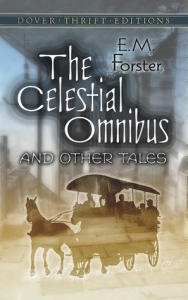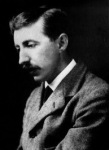I received an advanced review copy of this title from Dover Publications through NetGalley.
My Review:
 This brief collection of stories show the true depth of Forster’s literary talent and his ability to infuse fantasy and imagination into his writing. My favorite stories were two in the collection into which Forster incorporates many classical references.
This brief collection of stories show the true depth of Forster’s literary talent and his ability to infuse fantasy and imagination into his writing. My favorite stories were two in the collection into which Forster incorporates many classical references.
In the “Celestial Omnibus”, a boy discovers a sign for an omnibus in the lane across from his house. The alley is a very odd place for an omnibus to pass through so the boy gets up very early one morning to investigate it. When the sun rises a carriage does appear out of the fog and the driver picks the boy up. The boy goes on a journey of a lifetime through the clouds and he meets nymphs and great writers and heroes from famous books. The omnibus driver is Sir Thomas Browne, the famous essayist, but the boy doesn’t recognize or understand any of the famous people he meets; he just knows that he has had a wonderful time and has seen amazing things. The story is full of literary allusions and classical references but I won’t give any of them away here so as not to spoil them for other readers.
When the boy comes home after having disappeared all day, his father canes him for telling lies about his supposed journey to heaven. The boy’s neighbor, Mr. Bons, which happens to cleverly be “snob” spelled backwards, decides he will bring the boy back to the allow and show him that no such omnibus could possibly exist. But when the omnibus shows up in the alley and picks up Mr. Bons and the boy, Mr. Bons does not have the same magical experience on his journey as the boy; for Mr. Bons’ imagination is not as carefree and vast as the boy and he does not witness the same remarkable landscape as the boy does. It is no wonder in the end that Mr. Bons meets a horrible fate.
My other favorite in the collection is a story entitled “Other Kingdom.” In this story, an upper class aristocrat named Mr. Worters has taken a fiancé from Ireland, Evelyn Beaumont, who is much below his social status. In order to better educate his new fiancé, Mr. Worters hires a classics teacher, Mr. Inskip, to teach her Latin. It is evident from the beginning that Miss Beaumont does not have the intellectual capacity to learn ancient languages, but she does have a whimsical imagination and a carefree spirit.
Mr. Worters decides to buy his fiancé a wood, named Old Kingdom, for a wedding present. When Worters decides that the wood needs fences and paths and bridges, Miss Beaumont gets very upset that he is trying to organize and tame the natural wood. Through several allusions, the reader, or at least this reader, is quickly reminded of Ovid’s story of Daphne and Apollo in the Metamorphoses in which Apollo attempts to capture and tame Daphne the wood nymph. Similar to Apollo, Worters learns the harsh lesson that he cannot tame nature or the spirit of this woman. Miss Beaumont has a metamorphosis of her own but it is not the type that Worters had hoped for.
This is a collection of stories that I will reach for and reread over and over again and every time I read them I will discover something new and different. I highly recommend THE CELESTICAL OMNIBUS AND OTHER TALES from Dover Publications.
He had five novels published in his lifetime, achieving his greatest success with A Passage to India (1924) which takes as its subject the relationship between East and West, seen through the lens of India in the later days of the British Raj.
Forster’s views as a secular humanist are at the heart of his work, which often depicts the pursuit of personal connections in spite of the restrictions of contemporary society. He is noted for his use of symbolism as a technique in his novels, and he has been criticised for his attachment to mysticism. His other works include Where Angels Fear to Tread (1905), The Longest Journey (1907), A Room with a View (1908) and Maurice (1971), his posthumously published novel which tells of the coming of age of an explicitly gay male character.




Since he wrote one of my top five favorite books (ARWAV), I will check into this!
LikeLiked by 1 person
You don’t tend to think of Forster as a short story writer, but I remember reading a science fiction story of his, The Machine Stops – that was pretty good!
LikeLiked by 1 person
I’ve heard that one is excellent too! I’ll have to add it to my list.
LikeLike
How interesting! I didn’t know Forater had written stories, like these, so full of allusions and fantasy.
LikeLike